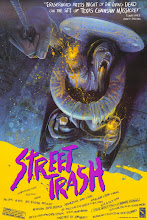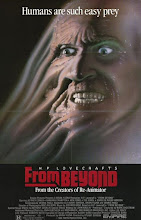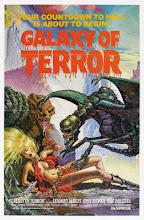
It's probably lazy when writing about film to continually resort to comparison with other films, but I still find myself doing it a lot. Perhaps it's particularly hard to avoid when discussing horror, because it's a genre that's continually feeding off of itself for new ideas. To paraphrase something I read at Fangoria recently, horror cinema gets by for the most part by cyclically regurgitating popular tropes and cliches, delivering what the fans are perceived to be hungering for at the time. The industry toils along in this opportunistic fashion, becoming more and more predictable and stale, until the next fresh idea is introduced in a new groundbreaking and original film. Yet sometimes a movie is original enough to stand on it's own, while comparisons to previous movies are still impossible to avoid. One such movie is Srdjan Spasojevic's A Serbian Film.

A Serbian Film feels as if Spasojevic watched the Hostel movies, and rather than being insulted by Roth's exaggerated perception of the troubles in post-soviet eastern Europe, saw it as a challenge to up the ante as far as disgust and brutality.
Above a subtext about American ignorance and xenophobia, Hostel is about the potential for entrepreneurial capitalists to exploit the instability that has resulted from rapid social, economic and political changes in the region (former Czechoslovakia in Hostel). However, it does so using a premise that is absurdly far fetched, requiring a major suspension of disbelief to go along with.
A Serbian Film on the other hand is grounded in a terror that is all too real and which is frequently seen in the news and dramatised on TV - the burgeoning illegal sex slave trade. The only really unrealistic element of Spasojevic's film is the snuff-industry angle, an urban myth that has been shown to be just that - a myth (see David Kerekes' & David Slater's excellent Killing For Culture: An Illustrated History Of Death Film From Mondo To Snuff published by Creation Books). Beyond that though, the events depicted in A Serbian Film are believable and are all the more appalling for that realism. Compounded with that sense of reality, the explicitly depicted atrocities in A Serbian Film make the violence in Roth's movies pale by comparison, making the whole experience that much more visceral, disturbing and just plain vile.

Another recent movie that has to be mentioned when talking about A Serbian Film (and Hostel I & II) is Martyrs. Beyond the similarities in premise (highly organised secret societies with paramilitary elements; torture and killing for ideological and financial motives) the four movies share a similar visual aesthetic. They're all shot, lit and colour graded with a kind of hyper-real slickness (particularly Srpski and the Hostel movies), and in the production design of the secret institutions all four films share a clinical, futuristic look that is more akin to science fiction movies than horror.
Beyond that comparison with Martyrs though, the more obvious similarity between the two movies is that it's the current Euro-horror film that is both topical and utterly transgressive in it's violence. This year's most talked about cult film for hardcore horror freaks. So, I guess my final word on A Serbian Film is what I see as the differences in motivation for Laugier and Spasojevic.
Almost every review I've read for Spasojevic's disgust-fest mentions the almost impenetrable ambiguity of it's "message" about the current state of affairs in Serbia. Western observers are looking for a meaning beneath it's violence and coming up with an almost unanimous cry of "I can't work it out, I guess you have to be Serbian to understand it". I can't fault all of these reviewers for seeking that deeper meaning, because I strongly believe that in much the same way as T.F. Mous' notorious Men Behind The Sun, Srpski is posing as a message movie to give it more gravitas, but ultimately it's little more than a very well made, highly memorable exploitation flick. Perhaps in both cases there was an original "higher" intention that was eventually lost in the desire to simply be as nasty as possible.

Martyrs could also be criticised for having a dubious and ambiguous meaning, but what Martyrs has in spades that Srpski lacks... is heart. As mean spirited and hard to watch as it is, it's a deeply emotive and affecting movie because you care for Lucie and Anna and witnessing their fate is heartbreaking. The horrible fate of Milos and his family did not elicit that emotion in me, just a dull sense of shock and revulsion.
I think the difference in the two director's intentions is most evident in Laugier's widely publicised assertions that the writing of Martyrs came from a deeply heartfelt place within him, at a time when he was going through a difficult period of particularly black depression. When I watch his film, I can see and feel all that emotion up on the screen. When I watch Spasojevic's Film I see a cynical, sneering exercise in depravity lurking shallowly beneath a thin veneer of sociopolitical commentary about porn, the illegal sex trade and some dodgy allusions to the Yugoslav wars. Just another exploitation flick, albeit one of the most disgusting ones I've ever seen.
After all that you might think that I hated A Serbian Film...
... but I actually really liked it.
Why? Because - like you - I'm a card carrying sicko!














_poster.jpg)

































































I was wondering if you'll review this film.
ReplyDeleteI watched it at the local film festival. Sat in the first front row with the director, screenwriter and the guy who played Vukmir. They were really laid back all the time during the film and they all held really short (and kinda dumb) speeches before the film. The director said that the whole film is an allegory to the current peoples emotional state in Serbia. The screenwriter said it's just a film and the actor said he has nothing to add.
I live in a country that's just next to Serbia and I was in Serbia for extended periods of time. This film isn't really showing how it is in Serbia at any level of the society nor its general situation. Like you mentioned before they had some sort of message but they lost it along the way.
What I do like about the film (other than the grotesqueness of it) is how it offended people. Basically every grotesque scene that occurred 20 to 30 people got up and left the cinema. The Yugoslav wars are here still a very touchy subject and portraying a war hero to be such an incest oriented man is something that really pissed people off. But people knew about most of the stuff that's in the film and went there willingly anyway only to leave offended. Bunch of dicks I say!
On an interesting note. The eye socket scene and the baby scene is something that also happens in one of the Uziga Waita books I have read. I tried to reach the director to ask him if he's reading guro but sadly he ran away. :(
Burek, very very interested to hear your take on this movie, thanks.
ReplyDeleteI have to admit it's kind of a relief for me to have my opinion backed up by someone who comes from the region and knows what they're talking about. In the 80's & early 90's I spent a little time in Croatia, Romania, Hungary and Czech because I lived in Austria. I've never been to Serbia, and even though I've visited the other places I am of course still very much an outsider, so my opinions could be suspect at best.
Also interesting what you said about the guro aspects of the eye and baby scenes as I too felt that kind of extreme grotesquerie was typically Japanese in nature!
Excellent review... and I agree completely. A well made exploitation flick with some very extreme imagery. At times it almost feels like the director is winking at us - 'you think that's fucked up, wait till you see THIS' - and as undeniably sick as it all is, the film has nothing like the impact I was expecting.
ReplyDeleteWhatever alleged political message he was trying to convey, it's not up there on the screen. It was very interesting to read Burek's comments as well, coming from someone who lives in that part of the world.
I enjoyed Serbian Film for what it was though. I definitely agree that there is a Japanese influence here - Niku Daruma comes to mind - and it will be interesting to see what this director does next!
Yeah, it will be interesting to see what he follows up something like THIS with! A romantic comedy perhaps?
ReplyDeleteSoooooooo.....pretty easy to masturbate to then? ALL RIGHT!!
ReplyDeletenot watched this yet - but liked the mention of Killing for culture a very good book - also worthy of mention is David kereke's long-running journal headpress - which is a simply fantastic publication!
ReplyDeleteGreat review Aylmer, one of the best pieces of writing I've read about this film... I still haven't decided if I'm gonna see this film yet. When I was a kid I would have sought this out in a heartbeat, but now that I'm heading towards old age (well, mid-30's at least) I'm approaching this kind of thing with caution... the world is depressing enough as it is...
ReplyDeleteAnd the thing is Wes, that although I'll recommend other ultra violent fare like INSIDE and MARTYRS in a heartbeat, I'm very reticent to recommend this to anyone. I think a movie depicting this level of sexualised violence is a movie that one has to decide to watch on their own. Or not as the case may be.
ReplyDeleteHow could you not love this movie!
ReplyDeleteIts just, willing to go the distance to disturb you!
I mean, they only wait till like the halfway point to show the baby raping!